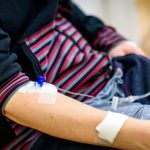Lacerations and cuts occur frequently and must be managed carefully to avoid infections and further injury. Depending on which part of the body the wound has occurred will also determine the need for stitches or require basic wound care. In addition, animal bites usually need to be examined by a physician due to the high-risk of infection and disease. Learn more about emergency wound care from Physicians Palm Beach Gardens.
Stop the Bleeding
If you sustain a cut that is bleeding profusely, apply a clean gauze or paper towel and apply pressure directly to the wound to stop the bleeding. After ten minutes, release the pressure and examine the laceration. If the wound continues to bleed, you may need stitches. Also, if you can see a yellowish fatty layer or deep red tissues, a few stitches may be needed to close the wound and assist healing without an infection.
Tetanus Shots
For animal bites or wounds that have been exposed to dirt, rusty objects or a dusty surface, you may be due for a tetanus shot to protect you from a toxin that causes painful muscle spasms. Although different areas of the country provide separate guidelines and recommendations, the rule of thumb for a tetanus shot is every seven to ten years. For more information on Tetanus injections, contact the Doctors Office in Palm Beach Gardens.
When Stitches may be Necessary
If you have a cut to the facial area, you may want to be stitched by a plastic surgeon to avoid scarring or undesirable discoloration. A cut on the knee or elbow may require stitches to stay closed during the normal movement of the joint. In addition, cuts of the hand may heal faster with a few stitches and a bandage that keeps the hand protected. Contact your local Medical Office in Palm Beach Gardens for more information.
Basic Wound Care: Physicians Palm Beach Gardens
Most small wounds that do not require stitches can be washed with a mild soap and warm water. Apply a small amount of antibiotic and cover the cut with a clean dry bandage. Change the bandage daily and when it becomes soiled with drainage or dirt. Examine the wound daily and report an increase of redness, foul odor or pus-filled drainage to your physician immediately.






